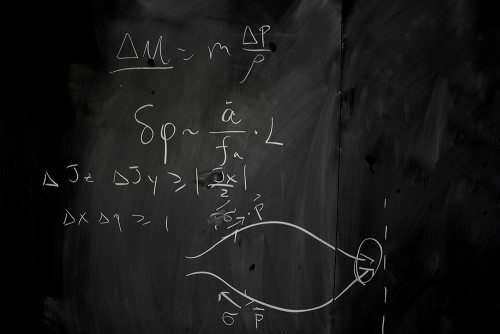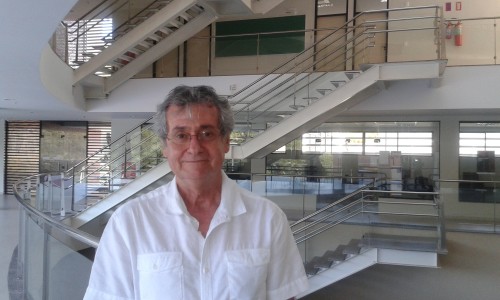Tag archives: theoretical physics
Test your brains with the Physics World blackboard quiz
By Matin Durrani
Can you tell what branch of physics is being described on the blackboard above? It’s one of six photographs taken by the communications folks at the Perimeter Institute for Theoretical Physics in Waterloo, Canada, where blackboards are an integral feature of the building’s design, appearing everywhere from the lifts to coffee areas.
In this quiz, your task is to study six blackboards and match them up with the physics topics they represent. There’s no prize, other than the satisfaction of having at least some inkling of what those clever theorists at the Perimeter are up to.
So here are the six topics:
• Accretion physics and general relativity
• Cosmology
• Neural networks and condensed matter
• Particle physics 1
• Particle physics 2
• Strings
And here are the six blackboards (you can click on each to see it in more detail).
Fermilab at 50: the June 2017 issue of Physics World is now out
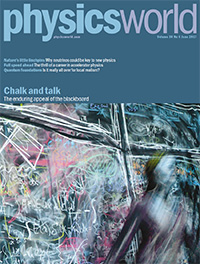 By Matin Durrani
By Matin Durrani
With America’s iconic Fermi National Accelerator Laboratory (Fermilab) celebrating its 50th anniversary this month, check out the June 2017 issue of Physics World magazine, which is now live in the Physics World app for mobile and desktop.
Fermilab mades its name with the Tevatron proton–antiproton collider but neutrinos hold the key to the lab’s future, as Ben Still from Queen Mary University of London makes clear in a feature on the physics of these elusive particles.
You can also enjoy a cracking review of Tommaso Dorigo’s new warts-and-all account of life in the CDF collaboration at Fermilab, while Seyda Ipek from the lab pops up in Philip Ball’s homage to the blackboard – which you can also read on physicsworld.com.
Plus don’t miss this month’s Lateral Thoughts, which reveals how one physicist working in a Scottish call centre ended up chatting to Enrico Fermi’s daughter-in-law about her TV.
Remember that if you’re a member of the Institute of Physics, you can read Physics World magazine every month via our digital apps for iOS, Android and Web browsers.
View all posts by this author | View this author's profile
Freeman Dyson on the physics dream team, Tycho Brahe’s heavy metal, Tintin bags an astronomical sum
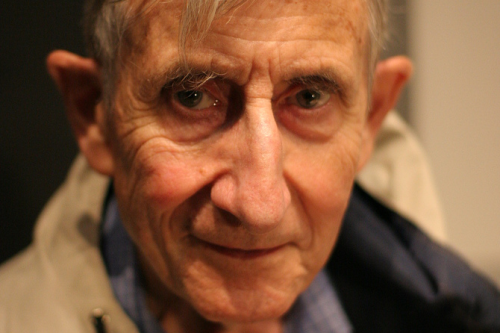
Mr Freeman Dyson: “so lucky” not to have a PhD. (CC BY-SA 2.0/Jacob Appelbaum)
By Hamish Johnston
What would it be like to have known Hans Bethe, Wolfgang Pauli, Robert Oppenheimer and Richard Feynman? One person who can tell is the theoretical physicist Freeman Dyson, who recounts his extraordinary life in an interview in Nautilus entitled “My life with the physics dream team”. Born in the UK, he got a degree in mathematics at the University of Cambridge before embarking on a PhD with Bethe at Cornell. Remarkably, Dyson did not complete his doctorate – something he seems rather pleased with: “I was so lucky. I slipped through the cracks.”
View all posts by this author | View this author's profile
A paradise for physics in Brazil
By Matin Durrani in Natal, Brazil
I took a break yesterday afternoon from the 50th anniversary meeting of the Brazil Physics Society here in Natal in the north-east of the country to visit the International Institute of Physics (IIP). Located on the campus of the Universidad Federal do Rio Grande do Norte, the IIP was founded in 2010 to carry out cutting-edge research in theoretical physics and help push forward Brazilian science on the international stage. If you’re a theorist, it’s hard to imagine a more pleasant environment for doing physics.
Previously housed in a small, cramped building (albeit with a swimming pool), the IIP moved into a shiny, new three-storey building in March this year. One striking architectural feature is the institute’s central atrium, which is fully open to the outside world. Natal has such a great climate – it’s 25–30 °C all year round and almost always sunny – that there’s no need for stuffy walls and doors. The design also lets the regular, strong breezes that blow into Natal from the Atlantic to add a delightful, cooling touch.
Carlo Rovelli discusses his ‘Seven Brief Lessons on Physics’
By Matin Durrani
A tiny, 83-page book about some of the basic principles of physics has been a surprise hit in Italy – becoming the single bestselling book of any kind to be published in the country this year.
The book has now been translated into English, entitled Seven Brief Lessons on Physics, and its author – the Italian-born theoretical physicist Carlo Rovelli – dropped by the Physics World offices in Bristol yesterday en route to giving a sold-out lecture about the book as part of the city’s Festival of Ideas.
In the interview above, Rovelli explains what the book’s about, how he managed to condensed big physics ideas into such a short space – and why its success was absolutely not what he expected.
When he’s not writing popular-science books, Rovelli is based at the University of Marseilles in France, where he carries out research into loop quantum gravity, which he once tackled for Physics World.
If you want to find out more about the book, check out Penguin’s rather splendid interactive website.
View all posts by this author | View this author's profile
How to inspire scientists in developing nations
By Matin Durrani
I’ve now returned to the UK from my visit to the International Centre for Theoretical Physics (ICTP) in Trieste, which has been celebrating the 50th anniversary of its founding. As part of those celebrations, the ICTP has created a special half-hour video documentary (above), which shows how scientists in various parts of the globe have not only furthered their own careers through visits to the ICTP, but have also used that experience to improve science back in their home countries
The video, which I watched in Trieste, features scientists from everywhere from Nepal to Cuba, from Ethiopa to Peru, and from Cameroon to China – and, of course, Pakistan itself where the ICTP’s founder Abdus Salam was from. Entitled From Theory to Reality: ICTP at 50, it was made by Italian film-maker Nicole Leghissa, who spent two months travelling around the world to the locations seen in the film.
Who was the real Abdus Salam?
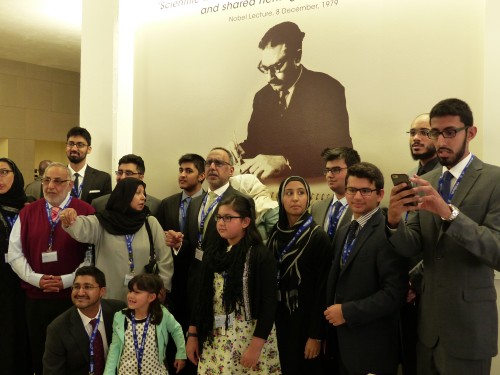
Honouring his achievements – members of Abdus Salam’s family at the International Centre for Theoretical Physics in Trieste.
Matin Durrani in Trieste, Italy
It’s now my third day here at the International Centre for Theoretical Physics (ICTP) in Trieste, which is celebrating its 50th anniversary in grand style. Two days ago we had a marvellous seven-course dinner at Duino Castle, including a hugely spectacular fruit-laden golden-jubilee cake, while yesterday there was a possibly even more sumptuous eight-course dinner hosted by the city that has been home to the centre for half a century.
But pervading all the events has been Abdus Salam, the Pakistani Nobel-prize-winning theoretical physicist who set up the centre in 1964. We know pretty much what Salam did from a scientific point of view, which was celebrated in his 1979 Nobel prize for unifying the weak and electromagnetic forces, but what exactly was he like as a person?
Abdus Salam’s legacy celebrated
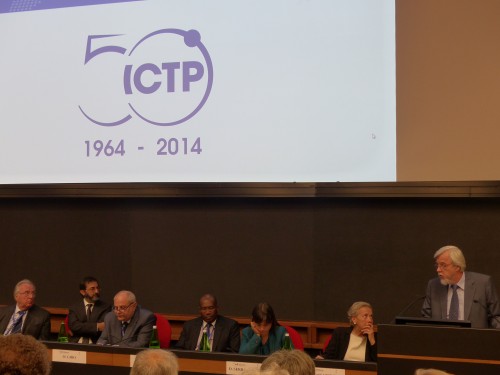
Celebrating Salam – Rolf-Dieter Heuer addresses guests at the opening session of the ICTP’s 50th-anniversary conference.
By Matin Durrani in Trieste, Italy
It was a small touch, but certainly quite surprising.
To kick off the opening session of the 50th-anniversary meeting of the International Centre for Theoretical Physics (ICTP), no-one spoke. Instead, the lights were dimmed until the audience was sitting in total darkness. Then emerged the voice of the ICTP’s founding father – the Pakistani theorist Abdus Salam, who died in 1996 – as a film started rolling on the screen at the front of the lecture hall. This was followed by a series of short video messages from selected physicists from around the world who benefited from the support of the ICTP early in their careers. As one physicist put it, the ICTP was “the launching pad” for their career. “It is a rare opportunity that so many people dream about,” added another.
View all posts by this author | View this author's profile
All eyes on the ICTP as it turns 50
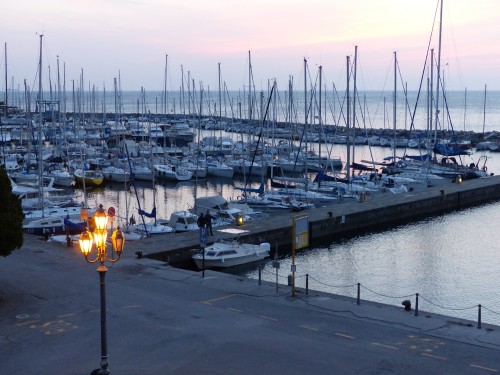
Golden days: the view from the guesthouse at the International Centre for Theoretical Physics as delegates arrive for a conference to mark its first 50 years.
By Matin Durrani in Trieste, Italy
When the Pakistani physicist Abdus Salam founded the International Centre for Theoretical Physics (ICTP) here in Trieste in 1964, I am sure he would have never quite dared to believe that it would go on to be such a success in helping to further the careers of some of the brightest minds from the developing world. Salam’s dream was for the ICTP to be a focal point for talented theorists from countries seeking to build up their research strengths, bringing such people into contact with leading physicists from front-ranking nations to carry out top-quality collaborative projects.
Now, 50 years after it began, the ICTP is hosting a golden-jubilee conference, where it is quite rightly celebrating all that it has achieved – and looking ahead to the future too.
